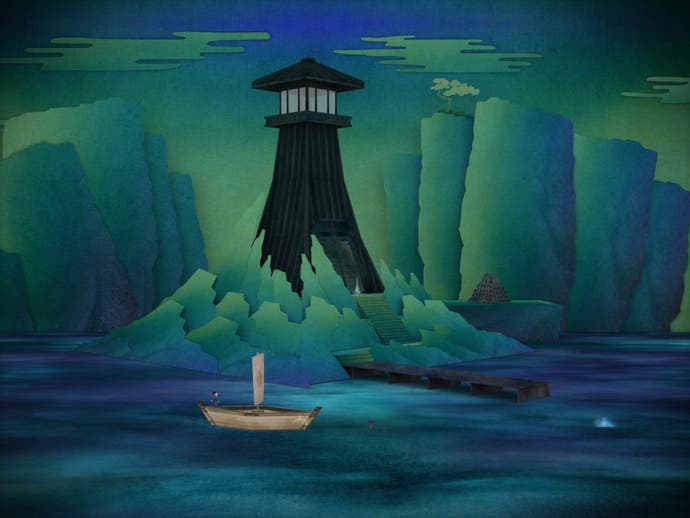Tengami review
Fold-fashioned.
This brief yet languid puzzle adventure, which brings a pop-up book of traditional Japanese illustration to life, is an obvious labour of love. It was made over three years by Nyamyam, a tiny team formed in late 2010 by a couple of ex-Rare staffers, Jennifer Schneidereit and Phil Tossell. Creative refugees from the corporate game factory, theirs is the sort of story that generates automatic goodwill. This goodwill is only reinforced by your first sight of the game's luminous, delicate visuals, and the obvious tactile pleasure of manipulating its papercraft world on the touchscreen: sliding tabs to move things, or flipping the pages of the book over to create a new scene or viewpoint.
Sadly, all that love and labour has resulted in little more than a nice idea and some gorgeous artwork in search of a game. A pop-up book begs to tell a story, but Tengami is a mechanical MacGuffin hunt with no characters, no narrative, no substance or resonance beyond a couple of wistful haikus about seasons passing. And a puzzle adventure needs puzzles, of which Tengami has few, and all but a couple are of feeble design. It's over in 90 minutes - and it would have been a lot less if your character, a man on a quest to restore blossom to a dying tree, didn't walk so slowly.
Brevity is no sin, of course. One of the great things about the mobile app markets is that they've created an environment where games can be small, intimate artworks that you can buy for loose change and spend a pleasurable hour or two turning over in your hands. Fireproof's Room games and Simogo's fabulously chilling Year Walk are great examples - and obvious bedfellows for Tengami, with their use of riddle-solving and gesture controls to open new spaces. But the comparison isn't flattering.

Fireproof and Simogo seem to have understood that they are working in a new medium and need to come up with a new lexicon, a new grammar, and new pacing to suit. The Rare alumni at Nyamyam haven't been able to shed their traditional gaming habits. In Tengami, you can change the world with a swipe, but only if you're standing in an incongruous, glowing interaction spot; you can fold scenery to create new pathways, but then you have to wait and watch your paper avatar plod to the next screen. The playable pop-up book keeps turning back into an old-fashioned and rather simplistic point-and-click video game.
With the amount of exploration and backtracking needed to solve some major puzzles, the slow movement is more tedious than relaxing. But the real problems are that the game never achieves the density to be satisfying, and that it treats its great premise as an occasional reward for progress rather than the very basis of your interaction with it. The best puzzles have you flipping slices of scenery up and down to create new pathways, although this idea isn't developed very far. Late on, there's also a cunning use of the space between scenes as you flip the pages - but only to serve a very rudimentary puzzle mechanic. Most of the other puzzles could have been done in any format, aren't at all elaborate in their design, and obey a rather arbitrary logic. In what sort of papercraft world can you move flame from one torch to the next by dragging your finger?
As you can see from the screenshots, Tengami is very pretty; it has a sumptuous, glowing pastel palette, and the textural grain of the paper is exquisitely realised on a Retina iPad screen. It creates a restful mood, wafted along on a soothing if slightly synthetic soundtrack by fan-favourite composer David Wise. It's a pleasant place to be, although it feels very superficially engaged with its subject matter. This is a feudal fairytale Japan of pagodas and wolves and cherry blossom and not much else; its inspiration is purely visual, not cultural or literary. Once again, there's a striking contrast with Year Walk, which engaged in such an earthy and full-blooded way with Scandinavian folklore, and achieved a much richer emotional and thematic tone.
At its best, Tengami is something you want to freeze-frame and hang on the wall. For a video game, that shouldn't be taken as a compliment.


